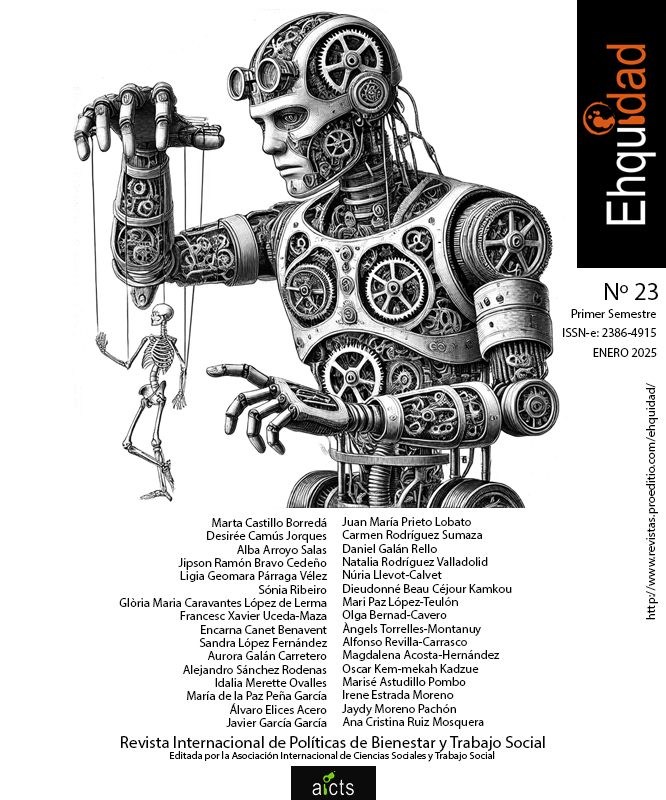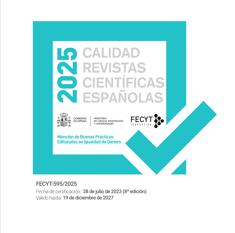Organizational climate: the perception of social workers in Portugal
DOI:
https://doi.org/10.15257/ehquidad.2025.0003Keywords:
Organizational Climate, Job Satisfaction, Social Workers, PortugalAbstract
Workers' perceptions of the organizational climate they experience have a significant impact, both at the individual and collective levels. The organizational climate influences feelings of organizational belonging, engagement, work productivity, employee well-being, among other aspects. It is within this framework that the analysis of organizational climate assumes particular importance. The objective of this study is to analyze the organizational climate perceived by a professional group in Portugal, specifically social workers. The methodology employed is quantitative and exploratory, utilizing an online questionnaire. The instruments used were a questionnaire socio-demographic and the Organizational Climate Assessment Questionnaire (QuACO). The sample consisted of 550 social workers practicing professionally in Portugal, selected through convenience sampling. Portuguese social workers exhibit lower satisfaction levels across various dimensions of the organizational climate compared to other professional groups, particularly regarding autonomy, workload, work environment, and job satisfaction. Only in terms of participation in decision-making do social workers demonstrate more satisfactory levels.
Downloads
References
Alamoudi, K. (2023). The relationship between perceived autonomy and work burnout amongst EFL teachers. International Journal of Research in Education and Science, 9(2), 389-406. https://doi.org/10.46328/ijres.3053
Allen, R., Lambert, E., Pasupuleti, S., Tolar-Cluse, T., Ventura, L. (2011). The Impact of Job Characteristics on Social and Human Service Worker. Journal of Social Work Practice, 25(1), 17 – 30. http://www.socwork.net/Allen-Lambert2004.pdf
Antunes, R. (2007). Os sentidos do trabalho – Ensaio sobre a afirmação e a negação do trabalho. (2.ªEd). São Paulo: Ed. Boitempo.
Araújo, M. (2009). Preditores Individuais e Organizacionais de Bullying no Local de Trabalho. PhD thesis. Universidade do Minho. https://shre.ink/DBAj
Balzer, W. (1997). User’s manual for the Job Descriptive Index (JDI; 1997 Revision) and the Job in General (JIG) Scales. Bowling Green: Bowling Green State University.
Beck, U. (2000a). The Brave New World of Work. Cambridge: Polity Press.
Beck, U. (2000b). Risk Society: Towards A New Modernity. London: Sage Publication.
Castel, R. (2003). As metamorfoses da questão social: Uma crónica do salário. Rio de Janeiro: Vozes.
Castro, M., Ribeiro, S. (2022). O impacto da COVID-19 em profissionais de serviço social portugueses e brasileiros: Um estudo exploratório. Revista Portuguesa de Investigação Comportamental e Social, 8(2), 1–17. https://doi.org/10.31211/rpics.2022.8.2.275
Chesnais, F. (1996). A mundialização financeira: génese, custo e apostas. Lisboa: Instituto Piaget.
Chlebanova, L., Rusnakova, M. (2022). Organizational culture in social services – focused on the workers’ well-being. SHS Web of Conferences, 1-10. https://doi.org/10.1051/shsconf/202213103003
Collins, S. (2008). Statutory Social Workers: Stress, Job Satisfaction, Coping, Social Support and Individual Differences. British Journal of Social Work, 38, 1173–1193. https://doi.org/10.1093/bjsw/bcm047
Correia, L., Gomes, A., Moreira, S. (2010). Stresse Ocupacional em Professores do ensino básico: Um Estudo Sobre as Diferenças Pessoais e Profissionais. In Actas do VII Simpósio Nacional de Investigação em Psicologia. Lisboa: Associação Portuguesa de Psicologia. https://core.ac.uk/download/pdf/55611229.pdf
Dejours, C. (2007). A banalização da injustiça social. Rio de janeiro: Fundação Getúlio Vargas.
Edú-Valsania S, Laguía A, Moriano J. (2022). Burnout: A Review of Theory and Measurement. International journal of environmental research and public health, 19(3), 1780. https://doi.org/10.3390/ijerph19031780
Ehrhart, M., Kuenzi, M. (2024). Organizational climate and occupational health. Em L. E. Tetrick, G. G. Fisher, M. T. Ford, & J. C. Quick (Eds.), Handbook of occupational health psychology (3rd ed., pp. 171–187). American Psychological Association. https://doi.org/10.1037/0000331-009
Geisler, M., Berthelsen, H., Muhonen, T. (2019). Retaining Social Workers: The Role of Quality of Work and Psychosocial Safety Climate for Work Engagement, Job Satisfaction, and Organizational Commitment. Human Service Organizations: Management, Leadership & Governance, 43(1), 1–15. https://doi.org/10.1080/23303131.2019.1569574
Gibson, F., McGrath, A., Reid, N. (1989). Occupational stress in social work. British Journal of Social Work, 19, 1–6. https://bit.ly/49ihUVf
Grint, K. (2002). Sociologia do Trabalho. Lisboa: Instituto Piaget.
Guo, W., Hancock, J., Cooper, D., Caldas, M. (2022). Job autonomy and employee burnout: the moderating role of power distance orientation. European Journal of Work and Organizational Psychology, 32(1), 79–94. https://doi.org/10.1080/1359432X.2022.2101451
Harvey, D. (2000). Condição pós-moderna: uma pesquisa sobre as origens da mudança cultural. S. Paulo: Loyda.
Hosseini, A., Javadian, S., Farahmand, M. (2018). The relationship between Organizational climate and Job performance in social workers in the city of Tehran. Quarterly journal of social work, 7 (1), 37-45. https://shre.ink/DUMM
Juhila, K., Ranta, J., Raitakari, S., Banks, S. (2021). Relational Autonomy and Service Choices in Social Worker–Client Conversations in an Outpatient Clinic for People Using Drugs. The British Journal of Social Work, 51(1), 170–186. https://doi.org/10.1093/bjsw/bcaa011
Lhuilier, D. (2009). Travail, management et santé psychique. Connexions, 91, 85-101. https://doi.org/10.3917/cnx.091.0085
Malheiro, J., Veloso, A. (2014). A satisfação laboral e a confiança organizacional em três empresas de tecnologias da informação: um estudo exploratório. Conferência - Investigação E Intervenção Em Recursos Humanos, 1. https://doi.org/10.26537/iirh.v0i1.1904
Marques-Teixeira, J. (2002). Burnout ou a síndrome da exaustão. Saúde Mental, IV(2), 8-19.
Maurin, E. (2009). La peur du déclassement. Une sociologie des récessions. França: Éditions du Seuil.
McFadden, P., Davies, H., Manthorpe, J., MacLochlainn, J., McGrory, S., Naylor, R., Mallett, J., Kirby, K., Currie, D., Schroder, H., Nicholl, P., Mullineux, J., McColgan, M. (2024). Safe Staffing and Workload Management in Social Work: A Scoping Review of Legislation, Policy and Practice. The British Journal of Social Work, 54(5), 2006–2026, https://doi.org/10.1093/bjsw/bcae017.
McIntyre, S., McIntyre, T., Silvério, J. (1998a). Questionário de Avaliação do Clima Organizacional (QuACO). In McIntyre T, McIntyre S, J Silvério, J. Estudo aprofundado da satisfação profissional, stress e recursos de coping dos profissionais de saúde da Região Norte. Porto: ARS Norte.
McIntyre, S., McIntyre, T., Silvério, J., Iglésias, C., Godinho, P. (1998b). Índice Descritivo do Trabalho. Translation and adaptation of the Job Descriptive Index and the Job in General scales (JDI & JIG).
McIntyre, S., McIntyre, T., Silvério, J. (2000). Work stress and job satisfaction in Portuguese health professionals. Em T. Cox, P. Dewe., K. Nielsen, & R. Cox (Eds.). European Academy of Occupational Health Psychology Conference Proceedings Series: Occupational Health Psychology Europe. Nottingham: I-WHO Publications.
Menezes, I., Gomes, A. (2010). Clima Organizacional: uma revisão histórica do construto. Psicologia em Revista, 16(1), 158-179. https://shre.ink/DU8G
Murray, R., Hartley, C., Coffee, P. (2023) Only my group will do: Evidence that social support protects athletes from burnout when they identify with those who provide it. Psychology of Sport and Exercise, 69, 102508. https://doi.org/10.1016/j.psychsport.2023.102508.
Pais, J. (2001). Ganchos, tachos e Biscates: Jovens Trabalho e Futuro. Porto: Ambar.
Peterson, F., Fischer, R. (2004). Organizational Culture and Climate. Encyclopedia of Applied Psychology, 715–721. https://doi.org/10.1016/b0-12-657410-3/00353-6
Piore, M., Sabel, C. (1984). The Second Industrial Divide. Nova Iorque: Basic Books.
Ramos, M. (2001). Desafiar o Desafio. Prevenção do Stresse no Trabalho. Lisboa: RH Editora.
Ravalier, J., Wainwright, E., Clabburn, O., Loon, M., Smyth, N. (2021). Working conditions and wellbeing in UK social workers. Journal of Social Work, 21(5), 1105-1123. https://doi.org/10.1177/1468017320949361
Reich, R. (1991). O Trabalho das Nações. Lisboa: Quetzal Editores.
Ribeiro, S., Amaro, M. (2017). A saúde mental dos assistentes sociais em Portugal. Public Sciences & Policies, 3(1), 127–146. https://bit.ly/49ihUVf
Rose, M. (2003). Good deal, bad deal? Job satisfaction in occupations. Work Employment and Society, 17(3), 503–30. https://doi.org/10.1177/09500170030173006
Ruisoto, P., Ramírez, M., García, P., Paladines-Costa, B., Vaca, S., Clemente-Suárez, V. (2021). Social Support Mediates the Effect of Burnout on Health in Health Care Professionals. Frontiers in psychology, 11, 623587. https://doi.org/10.3389/fpsyg.2020.623587
Santos, C. (2012). A dimensão técnico-operativa do Serviço Social: questões para reflexão. En C. Santos, S. Backs y Y. Guerra (Coord). A dimensão técnico-operativa no Serviço Social: desafios contemporâneos (pp. 15-38). Juiz de fora: Ed. UFJF.
Savicki, V., Cooley, E. (1994). Burnout in child protective service workers a longitudinal study. Journal of Organizational Behavior, 15, 655-666. https://doi.org/10.1002/job.4030150708
Schneider, B., Ehrhart, M., Macey, W. (2013). Organizational climate and culture. Annual Review of Psychology, 64, 361–388. https://doi.org/10.1146/annurev-psych-113011-143809
Sennett, R. (2006). A cultura do novo capitalismo. Rio de Janeiro: Record.
Singha, S. (2024). Nurturing Positive Organizational Climates to Enhance Work Success: A Positive Psychology Approach. Em E. Baykal. Fostering Organizational Sustainability With Positive Psychology (pp. 54-83). Pennsylvania: IGI Global.
Teles, H., Ramalho, N., Ribeiro, S., Ramalho, V. (2019). Níveis de estresse e engagement laboral dos assistentes sociais em Portugal. Estudos de Psicologia (Natal), 24(3), 258-268. https://dx.doi.org/10.22491/1678-4669.20190027
Thomsen, S., Soares, J, Nolan, P. (1999). Feelings of professional fulfilment and exhaustion in mental health personnel: the importance of organisational and individual factors. Psychotherapy and Psychosomatics, 68, 157–164.
Vilela, A. (2013). Boas Práticas de Igualdade de Género e sua Relação nos Domínios da Satisfação Laboral. (Masther’s thesis). Instituto Politécnico do Porto.
Werlang R., Mendes J. (2013). Sofrimento social. Serviço Social e Sociedade, 116, 743-768. http://www.scielo.br/pdf/sssoc/n116/09.pdf.
West, M., Lyubovnikova, J. (2015). Organizational Climate. International Encyclopedia of the Social & Behavioral Sciences, 322–326. https://doi.org/10.1016/B978-0-08-097086-8.73073-X












